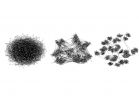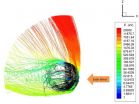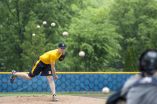(Press-News.org) For severely obese people, bariatric surgery may have a benefit besides dramatic weight loss: it can also substantially reduce urinary incontinence.
A new investigation led by UC San Francisco is the first to examine the longer-term effects of the surgical procedure on incontinence three years after bariatric surgery. The study appears online June 22 in JAMA Internal Medicine.
'Our findings showing another important long-term benefit to bariatric surgery might help to motivate people who are severely overweight,' said first author Leslee L. Subak, M.D., a UCSF professor in the departments of departments of obstetrics, gynecology & reproductive sciences, urology and epidemiology and biostatistics.
'Research has previously shown that weight loss by several methods -- low-calorie diet, behavioral weight reduction, and bariatric surgery -- were all associated with improved incontinence in overweight people through the first year,' Subak said. 'But there wasn't evidence of the longer-term effect of these changes. We wanted to see whether incontinence could be improved three years after bariatric surgery and identify factors associated with improvement in incontinence.'
Urinary incontinence affects an estimated 30 million adults in the U.S. and may account for as much as $60 billion in annual medical costs, according to published research. It can cause significant distress, limitations in daily functioning and reduced quality of life. Obesity is a key risk factor: each 5-unit increase in Body Mass Index (BMI) -- a ratio of someone's weight divided by the square of his or her height -- above normal weight is associated with far higher rates of incontinence.
The prevalence of incontinence has been reported to be as high as 70 percent among severely obese women, and 24 percent among severely obese men (BMI greater than 40, or more than 100 pounds higher than ideal body weight).
Bariatric surgery leads to weight loss by restricting the amount of food the stomach can hold, said the American Society for Metabolic and Bariatric Surgery. The most common procedures are gastric bypass, sleeve gastrectomy, adjustable gastric band, and biliopancreatic diversion with duodenal switch, reports the organization.
In the multicenter, observational incontinence analysis involving 10 hospitals around the country, nearly 2,000 people who underwent bariatric surgery between 2005 and 2009 were queried about their experiences with incontinence. Nearly half the women in the study and more than a fifth of the men reported having an episode of incontinence at least once a week prior to surgery.
The study participants ranged in age from 18 to 78 years old -- the median age was 47. The analysis controlled for factors such as age, race, smoking status and recent pregnancy. Nearly 79 percent of the participants in the study were women.
Following surgery and a large weight loss of 29 percent of body weight for women and 26 percent for men, substantial improvements in incontinence were observed, with a majority of women and men achieving remission three years post-surgery. The more weight lost, the higher the chances of improvement. While the risk of relapse rose with each gain of about 10 pounds, overall the researchers found substantial improvement for both women and men. People who were older, had severe walking limitations or were recently pregnant showed less improvement.
INFORMATION:
Contributing to the study from UCSF was senior author Alison J. Huang, M.D., associate professor of medicine.
The study was supported by the Longitudinal Assessment of Bariatric Surgery 2, a cooperative agreement funded by the National Institute of Diabetes and Digestive and Kidney Diseases. Subak is the recipient of grant K24 DK080775 from the National Institute of Diabetes and Digestive and Kidney Diseases.
About UCSF
UCSF is the nation's leading university exclusively focused on health. Now celebrating the 150th anniversary of its founding as a medical college, UCSF is dedicated to transforming health worldwide through advanced biomedical research, graduate-level education in the life sciences and health professions, and excellence in patient care. It includes top-ranked graduate schools of dentistry, medicine, nursing and pharmacy; a graduate division with world-renowned programs in the biological sciences, a preeminent biomedical research enterprise and top-tier hospitals, UCSF Medical Center and UCSF Benioff Children's Hospitals. Please visit http://www.ucsf.edu.
Somehow, colorful tropical scarlet macaws from tropical Mesoamerica -- the term anthropologists use to refer to Mexico and parts of northern Central America -- ended up hundreds of miles north in the desert ruins of an ancient civilization in what is now New Mexico.
Early scientists began excavating the large Pueblo settlements in Chaco Canyon in northwestern New Mexico and found the birds' remains in the late 1890s, but only recent radiocarbon dating of the physical evidence has pushed back the time period of sophisticated Pueblo culture by at least 150 years, according ...
Social networks affect every aspect of our lives, from the jobs we get and the technologies we adopt to the partners we choose and the healthiness of our lifestyles. But where do they come from?
In a new study, the University of Pennsylvania's Damon Centola shows how social networks form and what that means for the ideas that will spread across them.
Counterintuitively, he finds that breaking down group boundaries to increase the spread of knowledge across populations may ultimately result in less-effective knowledge sharing. Instead, his research shows that best ...
CORVALLIS, Ore. - A study at Oregon State University indicates that both a high-fat and a high-sugar diet, compared to a normal diet, cause changes in gut bacteria that appear related to a significant loss of "cognitive flexibility," or the power to adapt and adjust to changing situations.
This effect was most serious on the high-sugar diet, which also showed an impairment of early learning for both long-term and short-term memory.
The findings are consistent with some other studies about the impact of fat and sugar on cognitive function and behavior, and suggest that ...
If planets had personalities, Mars would be a rock star according to recent preliminary results from NASA's MAVEN spacecraft. Mars sports a "Mohawk" of escaping atmospheric particles at its poles, "wears" a layer of metal particles high in its atmosphere, and lights up with aurora after being smacked by solar storms. MAVEN is also mapping out the escaping atmospheric particles. The early results are being discussed at a MAVEN-sponsored "new media" workshop held in Berkeley, California, on June 19-21.
The Mars Atmosphere and Volatile Evolution (MAVEN) spacecraft was launched ...
COLUMBIA, Mo. - In 1964, renowned biologists Peter Raven and Paul Erhlich published a landmark study that introduced the concept of co-evolution. Using butterflies and plants as primary examples, the team determined that two species can reciprocally drive each other's evolution and development. Now, an international team of researchers led by the University of Missouri and Stockholm University has used cutting-edge genomics to analyze the co-evolution theory and identified the mechanisms responsible for this phenomenon. Scientists believe that understanding how co-evolution ...
Our brains track moving objects by applying one of the algorithms your phone's GPS uses, according to researchers at the University of Rochester. This same algorithm also explains why we are fooled by several motion-related optical illusions, including the sudden "break" of baseball's well known "curveball illusion."
The new open-access study published in PNAS shows that our brains apply an algorithm, known as a Kalman filter, when tracking an object's position. This algorithm helps the brain process less than perfect visual signals, such as when objects move to the ...
Amid reports that rank today's teens as the most stressed generation in the country, a new study offers hope for helping them effectively manage stress and build long-term resiliency. A pilot study, published in the spring issue of the journal Advances in Mind-Body Medicine, describes how a stress-reduction/resiliency-building curriculum developed by the Benson-Henry Institute (BHI) at Massachusetts General Hospital (MGH) helped a group of Boston-area high school students significantly reduce their anxiety levels, increase productivity and effectively manage stress over ...
PROVIDENCE, R.I. [Brown University] -- Fish are power eaters. In many species, large muscles running along their backs and bellies provide bursts of speed for chasing down prey. Then, at the very instant they close in, they vacuum victims into their suddenly gaping mouths with overwhelming suction. It turns out that these power surges are no anatomical coincidence. A new study shows that largemouth bass get their slurping power from the very same muscles that provide their swimming power.
In the Proceedings of the National Academy of Sciences, Brown University researchers ...
Chemists and biologists at UC San Diego have succeeded in designing and synthesizing an artificial cell membrane capable of sustaining continual growth, just like a living cell.
Their achievement, detailed in a paper published in this week's issue of the Proceedings of the National Academy of Sciences, will allow scientists to more accurately replicate the behavior of living cell membranes, which until now have been modeled only by synthetic cell membranes without the ability to add new phospholipids.
'The membranes we created, though completely synthetic, mimic several ...
WASHINGTON (June 18, 2015) -- Research published in the Proceedings of the National Academy of Sciences found that some individuals exposed to HIV-1, but who remain uninfected, have a certain pattern of virus-specific immune responses that differentiated them from individuals who became infected. The findings build upon prior research by studying these responses in the context of a controlled clinical trial, examining a large number of subjects, and by having access to specimens saved before anyone was infected. In the future, this information could be used to assess HIV-1 ...




